Fleurs du Mal Magazine


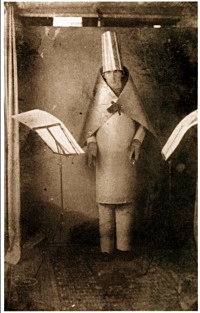
Bagatelle
Vor meinem Fenster,
Im Sonnenschein
Sitzen Engelein.
Eins, zwei, drei Engelein
Und äugeln herein.
Sie hauchen an die Scheiben
Und kichern sich an,
Und schreiben
Deinen Namen hin.
Und kichern sich an
Und verwischen ihn.
Und blinzeln gar boshaft
Und neckisch herein,
Und flattern fort
Die drei Engelein.
Hugo Ball
(1886-1927)
Bagatelle
fleursdumal.nl magazine
More in: Archive A-B, Ball, Hugo, Dada, DADA, Dadaïsme
Over het pad rijdt hij terug naar de brug. Boos. Er is niets over van de molen die hij zich herinnert. Niets van de sprookjesachtige wereld van vroeger. De graanzolder waar zich bokkenrijders verscholen hadden. Het molenhuis waar de stenen over elkaar schuurden, een geluid dat leek op het kermen van gemartelde heksen. Was hij er maar niet naartoe gegaan. Wat hij gezien heeft tast zijn herinneringen aan.
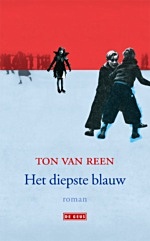 Had hij kunnen voorkomen dat de molen een uitspanning zou worden voor dagjesmensen? Na de dood van grootvader Bernhard was de molen opnieuw in verval geraakt. Een boer had er kalveren in ondergebracht. Later had er een autosloper in gezeten. Het weitje had zo vol hoog opgetast schroot gestaan dat de molen uit het zicht was verdwenen.
Had hij kunnen voorkomen dat de molen een uitspanning zou worden voor dagjesmensen? Na de dood van grootvader Bernhard was de molen opnieuw in verval geraakt. Een boer had er kalveren in ondergebracht. Later had er een autosloper in gezeten. Het weitje had zo vol hoog opgetast schroot gestaan dat de molen uit het zicht was verdwenen.
Veel te laat had hij beseft dat hijzelf de molen had moeten kopen. Voor een prikje had hij hem kunnen krijgen van de heren Hubben, die altijd eigenaren waren gebleven, maar er geen enkele belangstelling voor hadden. Nu beseft hij pas dat er geen mooiere plek was geweest om te wonen.
Toen de autosloper was verdwenen, was de molen uitgeroepen tot monument. Historisch erfgoed, dat behouden kon blijven door er een nuttig doel voor te zoeken. Dit was het dan geworden: een koek-en-zopie-tent in zuurtjeskleuren.
Waarom ergert hij zich zo aan de mensen die de molen veranderd hebben? Hij moet zichzelf verwijten maken.
Hij staat stil, vlak bij de beek. Langs de oever is een palissade geslagen, om afkalving te voorkomen. De waterlelies en lisdodden zijn verdwenen.
Ton van Reen: Het diepste blauw (052)
wordt vervolgd
fleursdumal.nl magazine
More in: - Book Stories, - Het diepste blauw, Archive Q-R, Reen, Ton van

Die Verlassene
An K. J.
Du irrst dich. Glaubst du, daß du fern bist
Und daß ich dürste und dich nicht mehr finden kann?
Ich fasse dich mit meinen Augen an,
Mit diesen Augen, deren jedes finster und ein Stern ist.
Ich zieh dich unter dieses Lid
Und schließ es zu und du bist ganz darinnen.
Wie willst du gehn aus meinen Sinnen,
Dem Jägergarn, dem nie ein Wild entflieht?
Du läßt mich nicht aus deiner Hand mehr fallen
Wie einen welken Strauß,
Der auf die Straße niederweht, vorm Haus
Zertreten und bestäubt von allen.
Ich hab dich liebgehabt. So lieb.
Ich habe so geweint … mit heißen Bitten …
Und liebe dich noch mehr, weil ich um dich gelitten,
Als deine Feder keinen Brief, mir keinen Brief mehr schrieb.
Ich nannte Freund und Herr und Leuchtturmwächter
Auf schmalem Inselstrich,
Den Gärtner meines Früchtegartens dich,
Und waren tausend weiser, keiner war gerechter.
Ich spürte kaum, daß mir der Hafen brach,
Der meine Jugend hielt – und kleine Sonnen,
Daß sie vertropft, in Sand verronnen.
Ich stand und sah dir nach.
Dein Durchgang blieb in meinen Tagen,
Wie Wohlgeruch in einem Kleide hängt,
Den es nicht kennt, nicht rechnet, nur empfängt,
Um immer ihn zu tragen.
Gertrud Kolmar
(1894-1943)
gedicht: Die Verlassene
fleursdumal.nl magazine
More in: Archive K-L, Archive K-L, Kolmar, Gertrud
The story of how literature shaped world history, in sixteen acts—from Alexander the Great and the Iliad to Don Quixote and Harry Potter
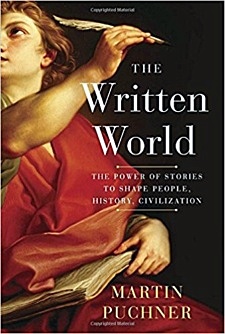 In this groundbreaking book, Martin Puchner leads us on a remarkable journey through time and around the globe to reveal the powerful role stories and literature have played in creating the world we have today.
In this groundbreaking book, Martin Puchner leads us on a remarkable journey through time and around the globe to reveal the powerful role stories and literature have played in creating the world we have today.
Puchner introduces us to numerous visionaries as he explores sixteen foundational texts selected from more than four thousand years of world literature and reveals how writing has inspired the rise and fall of empires and nations, the spark of philosophical and political ideas, and the birth of religious beliefs. Indeed, literature has touched the lives of generations and changed the course of history.
At the heart of this book are works, some long-lost and rediscovered, that have shaped civilization: the first written masterpiece, the Epic of Gilgamesh; Ezra’s Hebrew Bible, created as scripture; the teachings of Buddha, Confucius, Socrates, and Jesus; and the first great novel in world literature, The Tale of Genji, written by a Japanese woman known as Murasaki. Visiting Baghdad, Puchner tells of Scheherazade and the stories of One Thousand and One Nights, and in the Americas we watch the astonishing survival of the Maya epic Popol Vuh. Cervantes, who invented the modern novel, battles pirates both real (when he is taken prisoner) and literary (when a fake sequel to Don Quixote is published).
We learn of Benjamin Franklin’s pioneering work as a media entrepreneur, watch Goethe discover world literature in Sicily, and follow the rise in influence of The Communist Manifesto. We visit Troy, Pergamum, and China, and we speak with Nobel laureates Derek Walcott in the Caribbean and Orhan Pamuk in Istanbul, as well as the wordsmiths of the oral epic Sunjata in West Africa.
Throughout The Written World, Puchner’s delightful narrative also chronicles the inventions—writing technologies, the printing press, the book itself—that have shaped religion, politics, commerce, people, and history. In a book that Elaine Scarry has praised as “unique and spellbinding,” Puchner shows how literature turned our planet into a written world.
Title: The Written World
Subtitle: The Power of Stories to Shape People, History, Civilization
Author: Martin Puchner
Publisher: Random House
Format Hardcover, $32.00
ISBN-10 0812998936
ISBN-13 9780812998931
Publication Date: 24 October 2017
Nb of pages 448 p.
new books
fleursdumal.nl magazine
More in: - Book Lovers, - Book News, - Book Stories, Archive O-P, Art & Literature News, Libraries in Literature, PRESS & PUBLISHING, The Art of Reading
A new collection of thirteen mesmerizing stories by American master Joyce Carol Oates, including the 2017 Pushcart Prize–winning “Undocumented Alien”
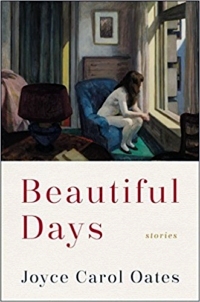 The diverse stories of Beautiful Days, Joyce Carol Oates explore the most secret, intimate, and unacknowledged interior lives of characters not unlike ourselves, who assert their independence in acts of bold and often irrevocable defiance.
The diverse stories of Beautiful Days, Joyce Carol Oates explore the most secret, intimate, and unacknowledged interior lives of characters not unlike ourselves, who assert their independence in acts of bold and often irrevocable defiance.
“Fleuve Bleu” exemplifies the rich sensuousness of Oates’s prose as lovers married to other persons vow to establish, in their intimacy, a ruthlessly honest, truth-telling authenticity missing elsewhere in their complicated lives, with unexpected results.
In “Big Burnt,” set on lushly rendered Lake George, in the Adirondacks, a cunningly manipulative university professor exploits a too-trusting woman in a way she could never have anticipated. “The Nice Girl” depicts a young woman who has been, through her life, infuriatingly “nice,” until she is forced to come to terms with the raw desperation of her deepest self. In a more experimental but no less intimate mode, “Les beaux jours” examines the ambiguities of an intensely erotic, exploitative relationship between a “master” artist and his adoring young female model. And the tragic “Undocumented Alien” depicts a young African student enrolled in an American university who is suddenly stripped of his student visa and forced to undergo a terrifying test of courage.
In these stories, as elsewhere in her fiction, Joyce Carol Oates exhibits her fascination with the social, psychological, and moral boundaries that govern our behavior—until the hour when they do not.
Title: Beautiful Days
Subtitle: Stories
Author: Joyce Carol Oates
Publisher: Ecco
Title First Published: 06 February 2018
Format: Hardcover
ISBN-10 0062795783
ISBN-13 9780062795786
Main content page count: 352
$26.99
new fiction
fleursdumal.nl magazine
More in: #Short Stories Archive, - Book Lovers, - Book Stories, Archive O-P, Art & Literature News
The story of how four young bohemians on the make – Bob Dylan, Joan Baez, Mimi Baez, and Richard Farina – converged in Greenwich Village, fell into love, and invented a sound and a style that are one of the most lasting legacies of the 1960s
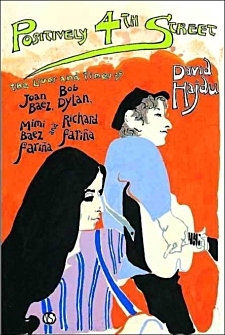 When Bob Dylan, age twenty-five, wrecked his motorcycle on the side of a road near Woodstock in 1966 and dropped out of the public eye, he was recognized as a genius, a youth idol, and the authentic voice of the counterculture: and Greenwich Village, where he first made his mark as a protest singer with an acid wit and a barbwire throat, was unquestionably the center of youth culture.
When Bob Dylan, age twenty-five, wrecked his motorcycle on the side of a road near Woodstock in 1966 and dropped out of the public eye, he was recognized as a genius, a youth idol, and the authentic voice of the counterculture: and Greenwich Village, where he first made his mark as a protest singer with an acid wit and a barbwire throat, was unquestionably the center of youth culture.
So embedded are Dylan and the Village in the legend of the Sixties–one of the most powerful legends we have these days–that it is easy to forget how it all came about. In Positively Fourth Street, David Hajdu, whose 1995 biography of jazz composer Billy Strayhorn was the best and most popular music book in many seasons, tells the story of the emergence of folk music from cult practice to popular and enduring art form as the story of a colorful foursome: not only Dylan but his part-time lover Joan Baez – the first voice of the new generation; her sister Mimi – beautiful, haunted, and an artist in her own right; and her husband Richard Farina, a comic novelist (Been Down So Long It Looks Like Up To Me) who invented the worldliwise bohemian persona that Dylan adopted–some say stole–and made as his own.
David Hajdu
Positively 4th Street
The Lives and Times of Joan Baez, Bob Dylan, Mimi Baez Farina, and Richard Farina
illustrated
English
24x209x141 mm
2011
ISBN10 0312680694
ISBN13 9780312680695
Picador USA
328 pages
paperback
fleursdumal.nl magazine
More in: #Beat Generation Archives, #Biography Archives, - Book Lovers, - Book Stories, Archive G-H, Bob Dylan
`Zo, jongens’, zegt grootvader, die het altijd druk heeft met de restauratie van de molen. `De zon is zo rood als een radijs. Vandaag krijgen we veel gratis water. Dat belooft dat we een week lang kunnen malen.’ Hij wrijft zich in de handen.
 Hij geeft hun elk een bos frisse radijsjes.
Hij geeft hun elk een bos frisse radijsjes.
`Weten jullie dat hier vroeger een kasteel stond, iets verderop langs de beek?’
`Waar is het gebleven?’ vraagt Mels, bijtend op een radijsje dat zijn tong prikkelt.
`Een paar honderd jaar geleden is het verzonken, met bewoners en al. In één nacht was alles weg. Als een straf van God voor de bewoners. Ze leefden in zonde. Ze werkten niet.’
`Dat is toch geen zonde’, zegt Thija. `Dat wil toch iedereen?’
`Verspilling van tijd was zonde. Feestvieren was toegeven aan de lusten van de duivel. De bewoners van het kasteel onderdrukten de mensen die grond en huizen van hen pachtten waar ze veel voor moesten betalen. Ze waren hoogmoedig. Op een kerstnacht moet het zijn gebeurd. In plaats van naar de kerk te gaan, vierden ze feest. Dat heeft God zo vertoornd dat hij hen met huid en haar naar de hel heeft gestuurd. Toen de mensen vroeg in de ochtend terugkwamen van de nachtmis, was alles weg. Van het slot was geen spoor meer te vinden. Maar soms kun je de klokken van het verdronken kasteel nog horen luiden.’
Ze lopen naar het weitje en gaan op de oever van de Wijer zitten, tussen madeliefjes en boterbloemen. Mels denkt na over het verhaal van grootvader. Hij kent het allang. De meester heeft het verteld, zijn moeder ook. Maar elke keer is het anders. In het verhaal van de meester was het de duivel aan wie de kasteelbewoners hun ziel hadden verkocht, Satan zelf die hen met hun hele hebben en houden naar de hel had gesleurd. In het verhaal van zijn moeder was het alleen een ridder die na dertig jaar thuiskwam van een kruisvaart en toen zijn vrouw aantrof met een andere man en een dozijn kinderen die ze van die ander had. In zijn woede had hij allen vermoord, maar net toen hij de hand aan zichzelf wilde slaan, zakte hij met kasteel en al weg in de grond, waar hij voor eeuwig zou blijven voortleven, jammerend over de moorden die hij had begaan.
Thija blaast de pluizen van een uitgebloeide paardenbloem. Wie alle pluizen in één keer wegblaast, mag een wens doen, maar je mag er niet over praten. Tegen niemand. Ook niet tegen vrienden. Mels moet op zijn tong bijten om er niet naar te vragen.
Hij trekt een pluim van het riet en steekt hem tussen de tanden. Hij buigt zich voorover en spiegelt zijn gezicht in een hoekje van de stroom waar het water stilstaat. Hij pakt zijn zakkammetje. Zijn haar is dik. De kam gaat er maar met moeite doorheen.
Hij hoort zijn moeder zingen, vlakbij, op haar veldje achter de tuin van grootvader Bernhard. Ze plukt onkruid dat ze altijd aan de kippen voert, zodat ze eieren met mooie donkergele dooiers leggen. Over het pad langs de Wijer loopt hij naar haar toe. In een opwelling laat hij haar de harmonica zien die hij al dagen in zijn zak heeft, zonder dat de anderen er iets van weten.
`Mooi.’ Moeder is verwonderd. `Hoe kom je eraan?’
`Hij is voor Tijger.’ Hij zegt het met een brok in zijn keel. `Maar nu ik hem heb gekocht, wil ik hem graag zelf houden.’
`Dan wordt het lastig.’ Moeder bukt zich naar de jonge slaplantjes om ze op slakken na te kijken. Waar ze slakken vermoedt, strooit ze zout, waarvan ze smelten. `Hou je dat ding zelf, dan heb je geen cadeau. Een geschenk is pas een echt geschenk als je iets geeft wat je graag voor jezelf wilt houden.’
Mels wil daarover nadenken. Dat kan hij beter als hij alleen is.
Hij loopt terug naar de molen en klimt over de buitentrap naar de zolder. Het is een plek waar ze vaak komen. Soms is hij er alleen.
Hij gaat op de grote weegschaal zitten en kijkt door het raam naar buiten. Nu hij hier binnen is, valt hem ineens op dat de wereld buiten heel anders is dan wanneer hij buiten is. In de stilte van de zolder is dit een plek die onaards is. Het komt door de zon die de spinnenwebben die in lagen voor de ruitjes zijn geweven in tovergordijnen verandert.
Ton van Reen: Het diepste blauw (051)
wordt vervolgd
fleursdumal.nl magazine
More in: - Book Stories, - Het diepste blauw, Archive Q-R, Reen, Ton van

In de doorslaap
Vriendelijk verwant zoals het werkwoord gapen
dat met slapen is liggen wij stilletjes hand in hand.
De hele nacht door sliep je lekker maar tegen
de ochtend werd je steeds weer van een piepje
wakker. Het leek of je keek naar de klei die ik kneed
alsof je weet dat het andere wolken zijn dan van donker:
in de doorslaap kerven zich de klamste dromen.
Bert Bevers
Gedicht: In de doorslaap
Uit Andere taal, Uitgeverij Litera Este, Borgerhout, 2010
Bert Bevers is a poet and writer who lives and works in Antwerp (Be)
fleursdumal.nl magazine
More in: Archive A-B, Archive A-B, Bevers, Bert
More in: Poetry International, STREET POETRY, THEATRE, TRANSLATION ARCHIVE
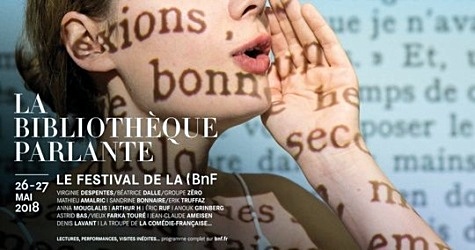
Festival de la BnF 2018 Paris
Les textes de La Bibliothèque parlante dans les collections de la BnF (samedi 26 et dimanche 27 mai 2018 – François-Mitterrand – BnF Paris)
# Website La Bibliothèque parlante
fleursdumal.nl magazine
More in: - Book News, Art & Literature News, AUDIO, CINEMA, RADIO & TV, FDM in Paris, Libraries in Literature
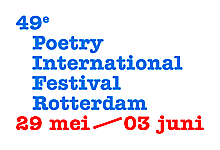
More in: Art & Literature News, Poetry International, TRANSLATION ARCHIVE
Drawing on draft manuscripts and other archival material, James Joyce and Absolute Music, explores Joyce’s deep engagement with musical structure, and his participation in the growing modernist discourse surrounding 19th-century musical forms.
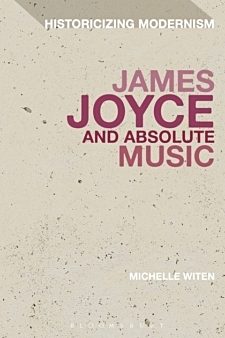 Michelle Witen examines Joyce’s claim of having structured the “Sirens” episode of his masterpiece, Ulysses, as a fuga per canonem, and his changing musical project from his early works, such as Dubliners and A Portrait of the Artist as a Young Man.
Michelle Witen examines Joyce’s claim of having structured the “Sirens” episode of his masterpiece, Ulysses, as a fuga per canonem, and his changing musical project from his early works, such as Dubliners and A Portrait of the Artist as a Young Man.
Informed by a deep understanding of music theory and history, the book goes on to consider the “pure music” of Joyce’s final work, Finnegans Wake.
Demonstrating the importance of music to Joyce, this ground-breaking study reveals new depths to this enduring body of work.
Towards a Modernist Condition of Absolute Music – Joyce’s Early Use of Music – Joyce’s fuga per canonem: A Case of Structure – Joyce’s fuga per canonem: A Case of Effect – Voided Fugue in “Circe” – “It’s Pure Music”: Finnegans Wake
Michelle Witen is Postdoctoral Teaching and Research Fellow at the University of Basel, Switzerland.
Michelle Witen
James Joyce and Absolute Music
Published: 22-02-2018
Format: Hardback
Edition: 1st
Extent: 320 p.
ISBN: 9781350014220
Imprint: Bloomsbury Academic
Series: Historicizing Modernism
Illustrations: 9 bw illus
Dimensions: 234 x 156 mm
RRP: £85.00
literature and music
fleursdumal.nl magazine
More in: # Music Archive, Archive I-J, Archive I-J, Art & Literature News, Joyce, James, Joyce, James
Thank you for reading Fleurs du Mal - magazine for art & literature